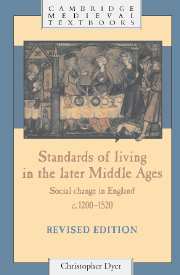Book contents
- Frontmatter
- Contents
- List of illustrations
- List of tables
- Preface
- Acknowledgements
- List of abbreviations
- Weights, measures and places
- Introduction
- 1 Late medieval society
- 2 Aristocratic incomes
- 3 The aristocracy as consumers
- 4 Aristocratic expenditure: making ends meet
- 5 Peasant living standards: modelling the peasant economy
- 6 Peasants as consumers
- 7 Urban standard of living
- 8 The wage-earners
- 9 Poverty and charity
- 10 The weather and standards of living
- Conclusion
- Medieval living standards – postscript
- Bibliography
- Index
- Cambridge Medieval Textbooks
2 - Aristocratic incomes
Published online by Cambridge University Press: 05 June 2012
- Frontmatter
- Contents
- List of illustrations
- List of tables
- Preface
- Acknowledgements
- List of abbreviations
- Weights, measures and places
- Introduction
- 1 Late medieval society
- 2 Aristocratic incomes
- 3 The aristocracy as consumers
- 4 Aristocratic expenditure: making ends meet
- 5 Peasant living standards: modelling the peasant economy
- 6 Peasants as consumers
- 7 Urban standard of living
- 8 The wage-earners
- 9 Poverty and charity
- 10 The weather and standards of living
- Conclusion
- Medieval living standards – postscript
- Bibliography
- Index
- Cambridge Medieval Textbooks
Summary
Late medieval aristocrats lived in constant anxiety about their incomes. This state of mind was to some extent justified throughout the period but they had especially good cause for concern after about 1320, when revenues from their estates began to decline for the first time in the known history of the class. They faced an economic crisis in the early fifteenth century, as land values became more deeply depressed.
The sources that historians can use to investigate aristocratic incomes are themselves the product of worried men. When incomes were steady and the class felt secure in the twelfth century, no-one bothered to keep accounts. When their complacency was shaken by rising prices in the period 1180–1220, they took demesnes that had previously been let out to farmers into direct management, and they then needed to keep more careful records. ‘Extents’ or ‘valors’ contained detailed descriptions of demesne lands and lists of tenants, ending with a cash sum for the value, the estimated annual income. Even more numerous were the manorial accounts, the first series beginning in 1208 for the estates of the bishopric of Winchester, with more from large estates by the middle of the thirteenth century. Large numbers of accounts were compiled for landlords of all kinds from the 1270s onwards. Such documents were the product of a laborious administrative process. First, the reeve or bailiff who looked after each manor kept records of payments, sales and purchases, in the form of tallies (receipts made from pieces of wood notched with the appropriate sum) or pieces of parchment containing bills or short-term records of accounts.
- Type
- Chapter
- Information
- Standards of Living in the Later Middle AgesSocial Change in England c.1200–1520, pp. 27 - 48Publisher: Cambridge University PressPrint publication year: 1989



